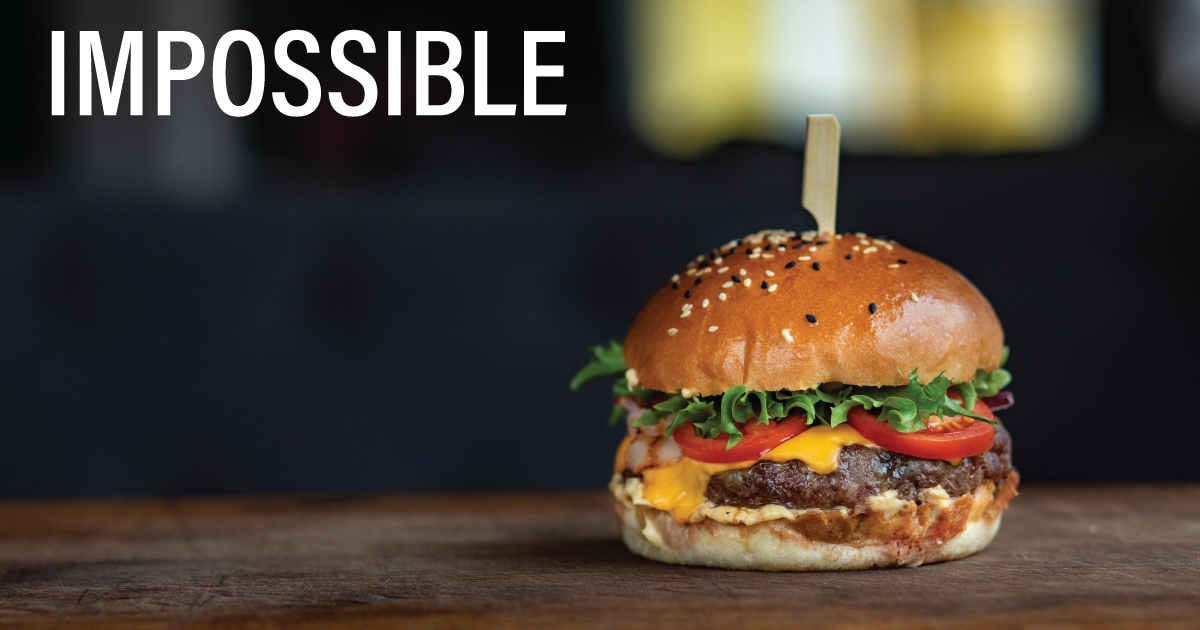
Impossible Burger Attacks Moms for Publishing Pesticide Results
Impossible Foods is billing its Impossible Burger as a healthier, more sustainable option than beef, but when tested by consumer advocacy group Moms Across America (MAA), concerning levels of the herbicide glyphosate were found in the food.
June 4, 2019 | Source: Mercola.com | by Dr. Joseph Mercola
Impossible Foods is billing its Impossible Burger as a healthier, more sustainable option than beef, but when tested by consumer advocacy group Moms Across America (MAA), concerning levels of the herbicide glyphosate were found in the food.1
It’s not at all surprising, considering the Impossible patty is made mostly of genetically engineered (GE) soy protein, and in the U.S. about 94 percent of soybean acres are planted with such GE seeds, which are designed to tolerate glyphosate, i.e., Roundup, herbicides.2
This alone pokes holes in their attempts to greenwash an otherwise highly processed fake food, but the company’s response to MAA’s findings is even more disconcerting.
Impossible Foods Resorts to Insults, Name-Calling to ‘Defend’ Their Fake Burger
Impossible Foods’ rebuttal to MAA’s glyphosate testing has taken a page out of Monsanto’s playbook: When a study shows reason for concern, immediately attempt to discredit the source using any means necessary, including insults and name-calling.
Rather than acknowledging that glyphosate in their food could be a problem — especially in light of the recent court cases against Bayer (which acquired Monsanto in 2018) totaling billions in judgments due to people who developed cancer as a result of Roundup use — they engaged in a veritable smear campaign against MAA.
In their Unofficial Correction of Moms Across America, Impossible Foods states, “MAA is an anti-GMO, anti-vaccine, anti-science, fundamentalist group that cynically peddles a toxic brew of medical misinformation and completely unregulated, untested, potentially toxic quack “supplements” … .”3
Really? In actuality, Moms Across America is a group of moms on a mission to raise awareness about toxic exposures and create healthy communities. They’ve previously commissioned research that’s revealed glyphosate lurking in everything from almond milk and hummus to orange juice and veggie burgers — information consumers should know.
Impossible Foods also highlighted MAA’s point that a staggering number of Americans have nonalcoholic fatty liver disease (NAFLD), to which they rebutted, “Huh? This is a complete non-sequitur.”4
Perhaps they’re not aware, then, that as more and more glyphosate has been sprayed on agricultural lands, parks and backyards, entering our food and water supplies, NAFLD rates have trended upward, from a prevalence of 15% in 2005 to 25% in 2010.5
Glyphosate not only has been linked to liver damage at ultralow doses,6 but people with a more severe form of NAFLD called nonalcoholic steatohepatitis, or NASH, had significantly higher residues of glyphosate in their urine, according to one recent study.7,8
As for MAA’s statements that glyphosate-based herbicides have been “proven to be carcinogenic,” Impossible Foods stated this is “a ridiculous claim” and “No regulatory authority in the world considers glyphosate to be carcinogenic to humans at current exposure levels,” tell this to the victims behind the at least 13,400 lawsuits that have been filed claiming exposure to glyphosate-containing Roundup caused health problems, including cancer.
The first three lawsuits have already ended in favor of the plaintiffs, leaving Bayer saddled with billions in damages. Zen Honeycutt, MAA’s executive director, brought up a good point, which is who will end up responsible for glyphosate’s toxic burden if the lawsuits leave Bayer bankrupt:9
“If Bayer goes bankrupt due to the outcome of about 14,000 lawsuits filed against them for the carcinogenic effects of glyphosate herbicides, who will become liable for harm to the public? I wonder if it will be retailers and food brands who continue to expose the public to toxic glyphosate herbicides.”
What Is the Impossible Burger?
Impossible Foods creates meatless burgers that “bleed” like real meat, due to the addition of soy leghemoglobin, or heme. This, the company says, it what makes meat taste like meat and, in plants, leghemoglobin is the protein that carries heme, an iron-containing molecule.
Originally, Impossible Foods harvested leghemoglobin from the roots of soy plants, but deemed that method unsustainable. Instead, they turned to genetic engineering, which they use to create a yeast engineered with the gene for soy leghemoglobin.
“This process allows us to make heme at scale with the lowest achievable environmental impact,” according to the company.10 The full ingredients list of their “new” recipe, which was released in January 2019, is as follows:11
“Water, Soy Protein Concentrate, Coconut Oil, Sunflower Oil, Natural Flavors, 2% or less of: Potato Protein, Methylcellulose, Yeast Extract, Cultured Dextrose, Food Starch Modified, Soy Leghemoglobin, Salt, Soy Protein Isolate, Mixed Tocopherols (Vitamin E), Zinc Gluconate, Thiamine Hydrochloride (Vitamin B1), Sodium Ascorbate (Vitamin C), Niacin, Pyridoxine Hydrochloride (Vitamin B6), Riboflavin (Vitamin B2), Vitamin B12. Contains: Soy”
You can find Impossible products in more than 5,000 restaurants in the U.S., Hong Kong, Macau and Singapore, in locations ranging from fine dining establishments to food trucks and theme parks.12 Even fast food outlets like Burger King and White Castle have jumped on the meatless fake burger bandwagon, with the former featuring the new Impossible Whopper that bills itself as “100% Whopper, 0% Beef.”
The glaring issue with fake foods such as these is that they’re claiming to be a healthier alternative to conventional burgers, but in fact are nothing more than highly processed pseudo-food — not the real food that so many Americans are after.
